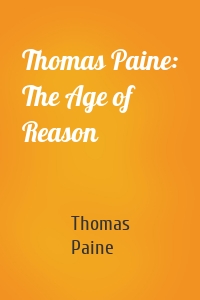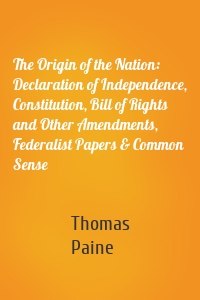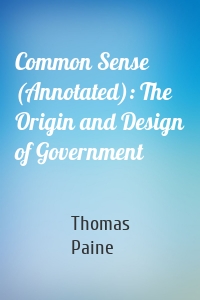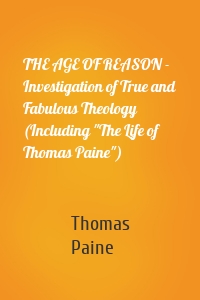Thomas Paine
33 кн.
Common Sense, Rights of Man, and Ot...
This volume collects together the most important writings of founding father Thomas Paine. First published on January 10, 1776, “Common Sense” was one the most influential and best-selling works from the colonial period. One of the central political arguments amongst the colonists of the pre-revolutionary period was whether or not they should seek freedom from British rule. In “Common Sense”, Paine provided a straightforward argument to the American people as to why they should seek...
| Автор | Thomas Paine |
Common Sense, Rights of Man, and Ot...
This volume collects together the most important writings of founding father Thomas Paine. First published on January 10, 1776, “Common Sense” was one the most influential and best-selling works from the colonial period. One of the central political arguments amongst the colonists of the pre-revolutionary period was whether or not they should seek freedom from British rule. In “Common Sense”, Paine provided a straightforward argument to the American people as to why they should seek...
| Автор | Thomas Paine |
The Rights of Man
A classic work of The Age of Enlightenment, «The Rights of Man» is Thomas Paine's response to Edmund Burke's «Reflections on the Revolution in France». Central to the theme of «The Rights of Man» and The Age of Enlightenment is the idea that reason should be the foundation of authority and government. A classic work of early American literature, «The Rights of Man» greatly exemplifies the philosophy that America was founded upon.
| Автор | Thomas Paine |
The Age of Reason
"The Age of Reason" is an influential work by Thomas Paine that follows in the tradition of eighteenth-century British deism, and challenges institutionalized religion and the legitimacy of the Bible. It presents common deistic arguments; for example, it highlights what Paine saw as corruption of the Christian Church and criticizes its efforts to acquire political power. Paine advocates reason in the place of revelation, leading him to reject miracles and to view the Bible as «an ordinary...
| Автор | Thomas Paine |
The Age of Reason
Thomas Paine, a seminal figure in American History, was an Englishman by birth who immigrated to America in 1774, where he quickly took up the cause of the independence of the American colonies from England. His famous work “Common Sense”, published in 1776, helped to gain public support for the American Revolution and established him as a central figure among the founding fathers. Later, while living in France during the French Revolution, Paine was dismayed by the increasing political...
| Автор | Thomas Paine |
The Age of Reason
Thomas Paine is a seminal figure in American History. An Englishman by birth, Paine immigrated to America in 1774 where he quickly took up the cause of the independence of the American colonies from England. His famous work «Common Sense» helped to gain great public support for the American Revolution and firmly established him as a central figure among the founding fathers. In «The Age of Reason» Paine turns his attention to a philosophical examination of Christianity. Within the work Paine...
| Автор | Thomas Paine |
The Age of Reason
"Of all the tyrannies that affect mankind, tyranny in religion is the worst," declared Thomas Paine, adding, «every other species of tyranny is limited to the world we live in; but this attempts to stride beyond the grave, and seeks to pursue us into eternity.» Paine's years of study and reflection on the role of religion in society culminated with his final work, <I>The Age of Reason.</I> This coolly reasoned polemic influenced religious thinking throughout the...
| Автор | Thomas Paine |
Thomas Paine: The Age of Reason
In «The Age of Reason» Thomas Paine, argues for the philosophical position of Deism. It follows in the tradition of eighteenth-century British deism, and challenges institutionalized religion and the legitimacy of the Bible. Paine's work inspired and guided many free thinkers.
| Автор | Thomas Paine |
The American Crisis
"The American Crisis" is a pamphlet series by the Enlightenment philosopher Thomas Paine, written during the American Revolution. Paine wrote these pamphlets in order to motivate people in the Colonies to join the war for independence from Britain. The pamphlets were contemporaneous with early parts of the American Revolution, during a time when colonists needed inspiring works. Paine, like many other politicians and scholars, knew that the Colonists weren't going to support the...
| Автор | Thomas Paine |
The Rights of Man
Originally published in two parts in 1791 and 1792, “The Rights of Man” is Thomas Paine’s defense of the French Revolution in response to Edmund Burke’s criticism in “Reflections on the Revolution in France.” A classic work of The Age of Enlightenment, “The Rights of Man” contends that reason should be the foundation of authority and government. Paine argues that any government that fails to protect the natural rights of its citizens should be opposed by political revolution. In accessible and...
| Автор | Thomas Paine |
THE RIGHTS OF MAN: The French Revol...
Thomas Paine's «Rights of Man» is born from his need to defend social mutiny and it posits that popular political revolution is permissible when a government does not safeguard the natural rights of its people. Using these points as a base Paine defends the French Revolution against Edmund Burke's attack in Reflections on the Revolution in France. Paine argues that the interests of the monarch and his people are united, and insists that the French Revolution should be understood as one...
| Автор | Thomas Paine |

























